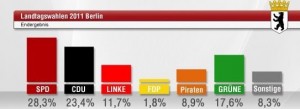 The – formerly – most exciting city in the world has voted, bear me out in telling you how it matters for Germany, Europe and the rest of the world.
The – formerly – most exciting city in the world has voted, bear me out in telling you how it matters for Germany, Europe and the rest of the world.
As can easily be perused on the left, the Social-Democrats (SPD) won with a less than astounding 28.3%, followed by the Conservatives (CDU) at 23.4%, the Greens at 17.6%, the Left (nomen est omen) at 11.7%, and the Pirates (we’ll get to it) at 8.9%.
Aside from these pure numbers what does this mean? First of all there are two possible coalitions for the reigning mayor of Berlin, Klaus Wowereit. While his former coalition partner the Left is not strong enough to sustain his government anymore he can choose between a tight majority with the Greens and a so-called Grand Coalition with the Conservatives. The former is clearly much more attractive to his electorate and seems the likelier choice at this point.
Yet, aside from this question of regional governance, a few notable aspects have come to the foreground in this election. First of all the CDU, for all its posturing on a relatively decent result in Berlin, has lost its fifth straight regional election. Even worse its dream (nightmare at this point?) coalition partner, the FDP failed to even enter parliament in all but one of these five. Even a desperate last-minute (last week really) attempt by its new leader Rösler to cater to bailout-tired and potentially eurosceptic voters failed to turn things around (and in fact might have decreased the FDP’s voting share even further as it had had been polling slightly better than it actually performed). Overall the national government’s unpopularity and perceived incompetence clearly was mirrored in this trouncing. The FDP in fact finished 7th, polling worse than even the right-wing NPD.
The Greens can be considered the biggest winning loser of these elections. While they increased their voting share by 4.5%, Renate Künast’s stated goal of replacing Wowereit teetered out unceremoniously. Lost in this brouhaha is the simple fact that the Greens seem to have truly managed to consolidate themselves in a league of its own. Not quite yet on par with the Volksparteien (SPD & CDU) but clearly ahead of the pack. The Left, in government for 10 years at this point, seems to have been passed by due to its inadequate attempts to unite East and West as well as opposition rhetoric and governing.
Which brings us to the most spectacular result of this election, the Pirate Party winning almost 9%. Keep in mind that this party did not even exist 5 years ago. It finished with 2% in the last national elections, which was seen as a tremendous success at the time. What does its sudden emergence onto the Berlin parliamentarian scene tell us? First of all that Berlin is a weird city of course. Lots of young people, many educated ones working in so-called creative professions. More importantly, it points to a significant decrease in party adherence. Basically 9% of the electorate decided to vote for a party they had in all likelihood never even heard of 5 years ago. In this sense the Pirates also showcase the instability of the post-reunification Berlin Republic party system. Lastly, the Pirates symbolize a distrust with traditional parties (of which the Greens as well as the Left have become one (rather: two) to a large extent) that usually does not find an expression at the urns.
What about Germany, Europe and the rest of the world then? Nationally it becomes clearer almost daily that the current government will not be reelected, the FDP fighting for its survival in almost every election will almost assuredly become increasingly erratic and lay an ever more important emphasis on principled issues of tax reductions and Eurozone bailouts. The good news for Europe and the German finances is that the FDP at this point is like a barking dog with no teeth. New elections would potentially put the FDP’s very existence at risk and as such Merkel should face a lot of noise but gain some pressure over FDP MPs reticent to abide by her (European) financial policy.
Germany’s partners in Europe also will be well aware of the fact that the current opposition (SPD as well as Greens) have made their preference for further economic integration including Eurobonds abundantly clear. As such Merkel’s reassured control over her government combined with a potentially more pro-active future German government could actually point towards a temporary and then long-term solution of the Eurozone crisis.